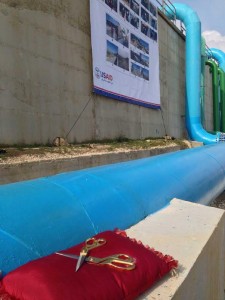[Halhoul, Hebron Governorate, Southern West Bank]
It was a day for water in all its incarnations.
The steel gray skies darkened and finally burst into one of the rare rainstorms of the season as the Palestinian Water Authority and United States Agency for International Development (USAID) inaugurated the Deir Sha’ar pipeline and the Halhoul reservoir, which are expected to change the tenor of life in the entire Southern West Bank, an area with a population of about 216,000.
At the ceremony, which was attended by Palestinian Prime Minister Rami Hamdallah, USAID’s West Bank and Gaza Mission Director Dave Harden issued what might pass for an American credo. “This is what we do,” he said. “We build. And we’re not going to stop till every Palestinian has clean water and sanitation. It’s the most important part of building a state.”
Harden, who has worked with Palestinians for over a decade, underscored that Palestine and the United States “are deep and sincere friends. Friends stick together in difficult times, and these are difficult times in Hebron.”
Clayton Alderman, the spokesperson for the US Consulate in Jerusalem, exulted that “this project is huge.”
“We’ve faced a massive water security issue in the Southern West Bank,” he said, gesturing up at the enormous cement bowl rising to his right. “It is an area that that has a huge need for massive infrastructure that can meet needs of the population.”
The United States has spent about $17 million on the life-changing project that has taken ten years to come to fruition and two years to build. It is, USAID announced in statement, “the backbone of the southern West Bank’s water infrastructure.”
While American-conceived and planned, the project, directed by USAID engineer Sonia Massis, was built by about 150 Palestinian workers, thus providing the beleaguered area with 200,000 person/days of construction, according to Issam Ahmed Abourmisha, Hebron’s Municipal Engineer.
Among the problems the new pipeline is expected to resolve is the loss in transmission of about 50% of all the water that had been destined for the local population.
The project replaces a thirty-year-old pipeline with an up-to-date 30 inch transmission line, 8 miles of new network pipes and an upgraded 6 mile stretch of road along the new line.
Whereas the old Deir Sha’ar pipeline had the capacity to transmit 4.75 million cubic meters (MCM) per year but lost half to leakage, the new pipeline transmits 5 MCM per year without any losses.
Halhoul is a dusty, small satellite town three miles north of Hebron, the West Bank’s largest city, with roots dating back to the Bronze Age. Hebron is located only twenty miles south of Jerusalem, but with a Casbah untouched by time and some roads still unpaved, it feels a world away.
Hundreds of Palestinian police officers secured Halhoul in advance of Hamdallah’s arrival, including a few border policemen who genially attempted to reroute a shepherd and his flock that blocked a central road.
Little girls in intricately embroidered traditional Palestinian gowns and pink bows in their hair fidgeted while waiting for their starring role handing the golden scissors to the prime minster, who officially declared the reservoir and pipeline open even as they filled with natural rainwater.
Ahmed Atari, a press officer accompanying Hamdallah, said the “very important project” would benefit about 200,000 people.
“It has been a fact of every year, the shortage of water. Next year, water will not be a problem.”
Ahmad el Jabari, another engineer and the head of Hebron’s interior ministry, said with notable satisfaction that “water security for the population of Hebron is a crucial achievement.”
Hamdallah’s remarks veered towards the political, when, in the only reference to Israel heard throughout the event, he spoke of “the need to defend our land from the encroachment of settlements.”
The heavily guarded Israeli settlement of Karmei Tzur, population about 800 religious Jews, is mere minutes away, and has running water provided by the Israeli government.
Hamdallah was, he allowed, “disappointed the American government have not released our money.”
This was a reference to the congressional vote last October that over the objections of the US State Department froze about $370 million in yearly aid funds to the Palestinian Authority.
American annual payments normally stand at $450 million, but were significantly “fined” in 2015 as a sanction against Palestinian Authority behavior towards Israel.
Pointing towards Harden, Hamdallah said, “he doesn’t make the decision, but he could do something.”
USAID has invested more than $300 million in hundreds of water and wastewater projects in the West Bank and Gaza in the past fifteen years. These include 560 miles of water pipelines; the construction or renovation of 28 reservoirs; the drilling or renovation of 29 wells and the connection of about 130,000 Palestinians to running water for the first time.
In total, according to USAID, these efforts have resulted in improved access to clean water for more than one million people.
